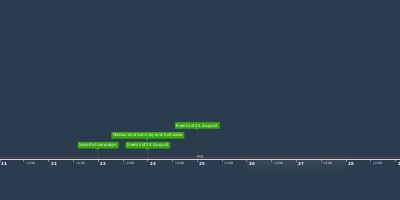5 sept. 1915 - Battle of Shabkadar
Description:
Major-General F. Campbell, commanding the British troops, determined to attack. The battle that followed was the biggest that had taken place on the North-West Frontier since 1897. Some of the British and Indian troops that took part in the engagement had reached their positions after record journeys. A British and Indian force covered a thirty-four mile march to Abazai, where the revolting tribes were reported in strong force, in ten marching hours, travelling at night and going over roads described by one officer who took part in the fight as "the most appalling I have ever seen." The dust was two feet deep. "You can imagine what this was like with cavalry on ahead of us and all our transport. I shall never forget the march as long as I live, nor will the others, and added to the dust was the frightful stifling heat. Not a man fell out, which is an extraordinary performance, especially as the last nine miles from Zearn to Abazai were done in the hottest part of the day— 12 to 3 p.m.—arriving at Abazai, the hottest and most mosquito and sandfly-ridden place on the frontier. The weary soldiers were bitten all night."Those troops were then ordered on to Matta, a levy post on the Shabkadar-Abazai road, where our outposts had already been heavily engaged and had been driven in, Mohmands estimated at 3,000 strong having practically surrounded them.
The troops who were engaged in this fighting with the Mohmands and their neighbours included many notable corps —the famous 21st (Empress of India's) Lancers, Skinner's Horse, Lumsden's Guides, Watson's Horse, the 14th Lancers, the Liverpool Regiment, the Royal Sussex Regiment, the North Staffordshires, and the Durham Light Infantry, besides Punjabis, Rajputs, Gurkhas, the Guides, the Sikhs, and the Dogras. Nor must we forget the Royal Artillery, who did very notable work.
On the morning of September 5th the tribesmen, who had come down from the hills by the Kuhn Pass, advanced right in the open nearly down to the Shabkadar village. As they approached, the British howitzers and field-guns opened on them, but the tribesmen kept on, threatening our left.
Ajouté au bande de temps:
Date:
5 sept. 1915
Maintenaint
~ Il y a 110 ans
